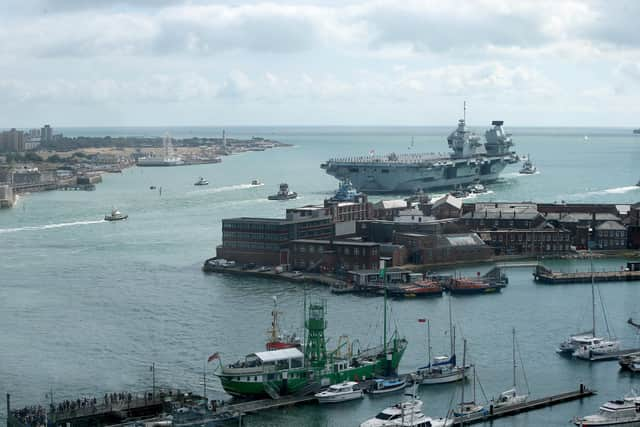Royal Navy and Portsmouth Naval Base: What is the Freedom of the city, what does it mean, what is the history of it, what can military regiments do and who has the honour?
and live on Freeview channel 276
Councillors have recently transferred the honour to Portsmouth Naval Base and Portsmouth Ships. And tomorrow more than 120 members of the Royal Navy, led by Band of Her Majesty’s Royal Marines Portsmouth, will march from Queen Street Gate, HMS Nelson to Guildhall Square for a short ceremony to mark this.
It was originally given to Portsmouth Command of the Royal Navy in 1964.
Advertisement
Hide AdAdvertisement
Hide AdThe honour was paid to give tribute to the traditions of the Royal Navy, and its contribution to the city.


Several institutions have freedom of the city, but what does it mean?
Here is all you need to know:
What is the Freedom of the city
The accolade is bestowed by a municipality upon a valued member of the community or institution.
It can also be given to authorities such as military units, which have earned a city’s trust – as a privilege.
Advertisement
Hide AdAdvertisement
Hide AdWhat is the history of the honour?
According to the Portsmouth City Council website, the honour for individuals dates back to the 12th and 13th centuries.
At the time, it was granted those with the acclaim political privileges such as being able to elect the officers of the corporation and its representatives in Parliament.
Boroughs found it convenient to elect these people of national importance, as they might be able to grant an area greater political and economic privileges.
After the Municipal Corporations Act of 1835, introducing town councils, these political powers for individuals were scrapped.
Advertisement
Hide AdAdvertisement
Hide AdIn 1885, an Act allowed municipal corporations to confer honorary freedoms to ‘men of distinction’, as long as it did not not give anyone a political or financial advantage.
As a military privilege, the accolade it dates back to the Roman period.
Romans regarded the boundary of the city as sacred, meaning an army could not enter armed or in formation.
This continued into the medieval period to protect civic security.
Advertisement
Hide AdAdvertisement
Hide AdToday, freedom of the city is a ceremonial award, and one of the oldest and highest civic honours in the Commonwealth of Nations.
What does it mean?
Freedom of the city is an honour which is bestowed upon prominent local individuals or institutions.
Acclaimed people have usually been judged to have contributed ‘outstanding services to the community’, according to Portsmouth City Council’s website.
Others with the honour are highly regarded politicians, naval and military figures, or members of the Royal family.
Advertisement
Hide AdAdvertisement
Hide AdThese individuals have usually been honoured by the local community for their service to the nation.
Military units with freedom of the city can parade through the city, showing the bond between regiments and the local area.
Traditionally, the parade involved marching ‘with drums beating, colours flying, and bayonets fixed’.
Now, it is a celebratory procession for long dedicated service to the local community.
Advertisement
Hide AdAdvertisement
Hide AdWhich institution and individuals have freedom of the city?
According to Portsmouth City Council’s website, the honour has been conferred to several local institutions.
This includes The Royal Hampshire Regiment (1950) – which was then transferred to the The Princess of Wales’s Regiment – The Corps of Royal Marines (1959), Portsmouth Football Club (2003), HMS King Alfred Royal Naval Reserve (2003), and HMS Endurance (2007).
People who have ben granted the honour in recent years include Honorary Alderman Syd Rapson in 2016 (British Empire Medal), Harry Redknapp and Portsmouth FC’s 2008 FA Cup winning squad, and Brian Kidd.
A message from the Editor, Mark Waldron
Subscribe here for unlimited access to all our coverage, including Pompey, for just 26p a day.
Comment Guidelines
National World encourages reader discussion on our stories. User feedback, insights and back-and-forth exchanges add a rich layer of context to reporting. Please review our Community Guidelines before commenting.
